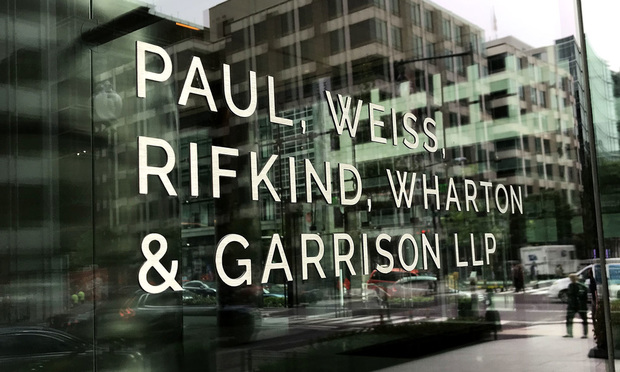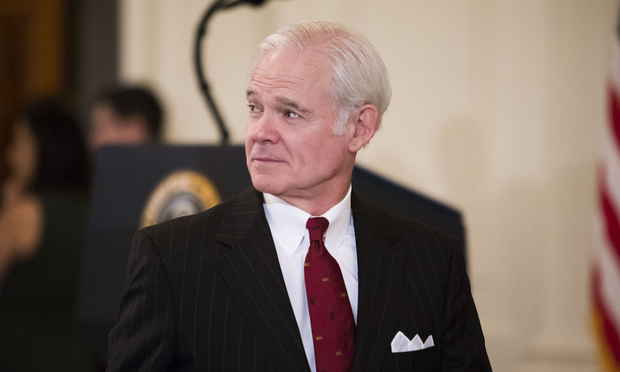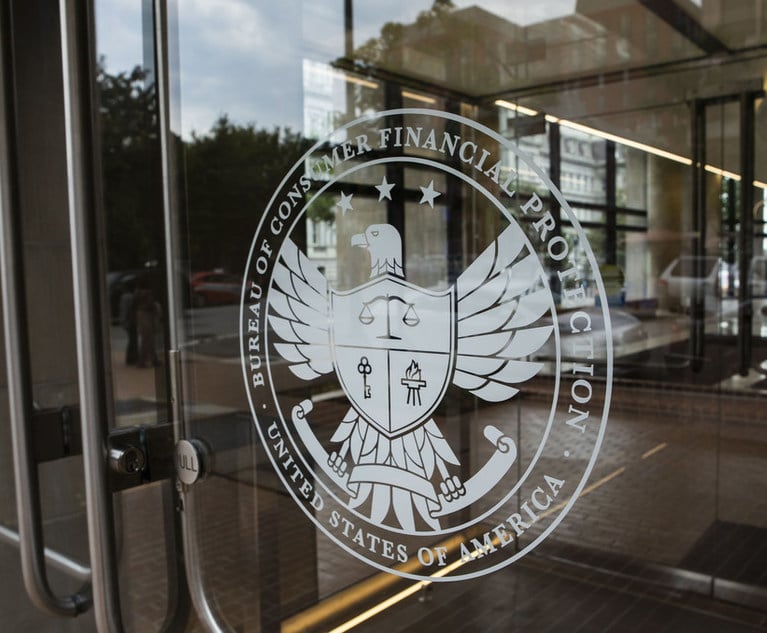Appellate Veterans Jockey at SCOTUS to Contest Consumer Bureau
The U.S. Supreme Court already has a petition from Paul Weiss challenging the structure of the Consumer Financial Protection Bureau. Now, a team from Gibson Dunn is giving the justices a new case to scrutinize.
October 01, 2019 at 10:56 AM
8 minute read
 Gibson, Dunn & Crutcher offices in Washington. Credit: Diego M. Radzinschi/ ALM
Gibson, Dunn & Crutcher offices in Washington. Credit: Diego M. Radzinschi/ ALM
Conservative appellate lawyers from major U.S. law firms are vying against each other at the U.S. Supreme Court as the justices weigh whether to hear arguments against the Consumer Financial Protection Bureau, an agency whose independent, single-director design long has drawn the ire of the financial industry and congressional Republicans.
It's the legal equivalent of elbow-throwing at the high court. Appellate lawyers representing different clients have given the justices competing arguments against the consumer bureau, framing their cases as the best path to confront a constitutional question that has reverberated in the lower courts, and divided them, for several years.
The Supreme Court is expected to announce soon whether the justices will hear any challenge to the structure of the consumer bureau, whose sole leader can only be removed from power for cause, not at will. Critics of the agency, which has reaped billions in penalties from financial companies, contend the power scheme violates the Constitution's separation of powers clause. A Supreme Court ruling against the bureau could carry implications for pending investigations and enforcement actions.
A team from Gibson, Dunn & Crutcher, including Theodore Olson, who served as the U.S. solicitor general in the George W. Bush administration, and Helgi Walker, a leader of the firm's regulatory group, late Monday asked the Supreme Court to take a case that the firm has overseen in the U.S. Court of Appeals for the Fifth Circuit. The move was remarkable, as the lawyers urged the Supreme Court to review the case even though the lower appeals court has yet to issue its opinion.
Gibson Dunn's filing was notable for another reason: It came as the Supreme Court is set to consider on Oct. 11 a separate petition from Seila Law, a California-based debt resolution firm that is represented by Paul, Weiss, Rifkind, Wharton & Garrison partner Kannon Shanmugam. Shanmugam, whose client lost in the Ninth Circuit, pitched the case in June to the U.S. Supreme Court.
 Paul, Weiss, Rifkind, Wharton & Garrison offices in Washington, D.C. Credit: Diego M. Radzinschi/ NLJ
Paul, Weiss, Rifkind, Wharton & Garrison offices in Washington, D.C. Credit: Diego M. Radzinschi/ NLJ"This case, which cleanly presents the question whether the CFPB is constitutional, is an ideal vehicle for the court's review. And the court's resolution of the question presented is urgently needed," Shanmugam wrote in his petition. He added: The constitutionality of the consumer bureau's structure "has sweeping legal and practical ramifications."
Paul Weiss and Gibson Dunn are squarely on the same side against the consumer bureau, but Gibson Dunn lawyers have fought the agency's structure longer than the Paul Weiss team and they contend their case is better suited for the justices. Shanmugam jumped into the dispute after Seila Law lost this summer in the Ninth Circuit. Gibson Dunn lawyers, including Olson, had pressed their constitutional claims against the CFPB for more than three years.
The Trump administration's Justice Department and the CFPB itself are now on the side of the business community, supporting Seila Law's challenge against the agency.
In Monday's filing, the Gibson Dunn lawyers presented client All American Check Cashing's challenge as the best case for the justices to confront the constitutionality of the CFPB. Olson, as counsel of record, and Walker contend that their case tees up an issue that Paul Weiss does not directly address: What's the remedy for companies if the court strikes down the single-director structure of the CFPB?
That question, Walker said, is where the "constitutional rubber hits the road, and if it is not addressed, the current uncertainty about what should actually happen in cases involving the CFPB will only grow." All American Check Cashing's attorneys have argued the CFPB's case should be dismissed if the bureau's structure is declared unconstitutional.
"Our case is an ideal vehicle because it raises not just the merits question but the absolutely essential question of remedies: If the CFPB is unconstitutionally structured, what does that mean as a practical matter?" said Walker, who argued for All American Check Cashing in the Fifth Circuit. "What good does it do for a litigant to 'win' on the constitutional question if the government action against him simply goes on as if the constitutional violation never happened, as some lower courts have held?"
Shanmugam declined to comment Monday about the Gibson Dunn petition.
Gibson Dunn's petition also appears to draw a contrast between the court action the CFPB took against All American Check Cashing and Seila Law. In a Mississippi federal court, the CFPB sued All American Check Cashing for allegedly deceiving customers. The CFPB went after Seila Law to force the firm to respond to an administrative subpoena, known as a civil investigative demand, that can be a precursor to a lawsuit.
Gibson Dunn lawyers told the Supreme Court that both cases raise the constitutional question. But the bureau's case against All American Check Cashing, unlike its lawsuit against Seila Law, "indisputably involves the exercise of core executive power by the CFPB: the initiation of a federal court civil enforcement action against All American on the merits," the Gibson Dunn lawyers wrote.
"Although the Fifth Circuit has not yet rendered a decision, there is nothing to be gained by waiting: The case for the constitutionality of the agency, pro and con, has already been exhaustively explored in the circuit courts in numerous thoughtful opinions," Olson and Walker wrote in their petition. They pointed to a pair of federal appeals court decisions upholding the CFPB's structure as constitutional.
The two CFPB cases, meanwhile, are not the only matters that confront the power of single-director agency heads.
Another prominent conservative lawyer has argued that the Supreme Court should address the constitutional question in a case that involves the Federal Housing Finance Agency, whose director enjoys similar protections against a politically motivated firing.
Charles Cooper of Washington's Cooper & Kirk, representing Fannie Mae and Freddie Mac shareholders, urged the justices a week ago to take his case, arriving from the Fifth Circuit. The appeals court ruled in favor of Cooper's clients, who argued the Federal Housing Finance Agency—like the CFPB—is unconstitutionally structured.
 Charles Cooper of Cooper & Kirk at the White House last year. Credit: Diegp M. Radzinschi / NLJ
Charles Cooper of Cooper & Kirk at the White House last year. Credit: Diegp M. Radzinschi / NLJCooper noted in his petition that the federal housing agency, unlike the CFPB, is standing by the lawfulness of its single-director power setup. The CFPB only recently switched sides, choosing to back arguments that the president should have the power to remove the director for any reason, not just for cause.
The justices would need to appoint a lawyer to defend the Ninth Circuit's decision in favor of the CFPB in the Seila Law case. The federal housing agency case doesn't present the same problem, Cooper told the justices. The Supreme Court would be able to hear directly from the federal housing agency, which is defending its single-director design.
"This case is a better vehicle than Seila Law because it concerns an agency that is currently defending its constitutional structure," Cooper wrote in his petition. "While the Solicitor General says that the Court can assure an adversary presentation by appointing an amicus to defend the statute in Seila Law, there is a simpler solution for guaranteeing an adversary presentation of the issues: grant certiorari in this case and let FHFA defend the constitutionality of its organic statute."
Read more:
CFPB, Changing Stance, Backs Law Firm Fighting Agency's Independent Design
Current and Former Texas Solicitors General Line Up Against CFPB
Can Kannon Shanmugam Make Paul Weiss 'The Best Little Law Firm' in Washington?
Consumer Bureau Lawyer Rebuked Over Racial Remarks Is Leaving Agency
This content has been archived. It is available through our partners, LexisNexis® and Bloomberg Law.
To view this content, please continue to their sites.
Not a Lexis Subscriber?
Subscribe Now
Not a Bloomberg Law Subscriber?
Subscribe Now
NOT FOR REPRINT
© 2025 ALM Global, LLC, All Rights Reserved. Request academic re-use from www.copyright.com. All other uses, submit a request to [email protected]. For more information visit Asset & Logo Licensing.
You Might Like
View All
CFPB Resolves Flurry of Enforcement Actions in Biden's Final Week

Wells Fargo and Bank of America Agree to Pay Combined $60 Million to Settle SEC Probe

Supreme Court May Limit Federal Prosecutions Over 'Misleading' but True Statements
Trending Stories
- 1New York-Based Skadden Team Joins White & Case Group in Mexico City for Citigroup Demerger
- 2No Two Wildfires Alike: Lawyers Take Different Legal Strategies in California
- 3Poop-Themed Dog Toy OK as Parody, but Still Tarnished Jack Daniel’s Brand, Court Says
- 4Meet the New President of NY's Association of Trial Court Jurists
- 5Lawyers' Phones Are Ringing: What Should Employers Do If ICE Raids Their Business?
Who Got The Work
J. Brugh Lower of Gibbons has entered an appearance for industrial equipment supplier Devco Corporation in a pending trademark infringement lawsuit. The suit, accusing the defendant of selling knock-off Graco products, was filed Dec. 18 in New Jersey District Court by Rivkin Radler on behalf of Graco Inc. and Graco Minnesota. The case, assigned to U.S. District Judge Zahid N. Quraishi, is 3:24-cv-11294, Graco Inc. et al v. Devco Corporation.
Who Got The Work
Rebecca Maller-Stein and Kent A. Yalowitz of Arnold & Porter Kaye Scholer have entered their appearances for Hanaco Venture Capital and its executives, Lior Prosor and David Frankel, in a pending securities lawsuit. The action, filed on Dec. 24 in New York Southern District Court by Zell, Aron & Co. on behalf of Goldeneye Advisors, accuses the defendants of negligently and fraudulently managing the plaintiff's $1 million investment. The case, assigned to U.S. District Judge Vernon S. Broderick, is 1:24-cv-09918, Goldeneye Advisors, LLC v. Hanaco Venture Capital, Ltd. et al.
Who Got The Work
Attorneys from A&O Shearman has stepped in as defense counsel for Toronto-Dominion Bank and other defendants in a pending securities class action. The suit, filed Dec. 11 in New York Southern District Court by Bleichmar Fonti & Auld, accuses the defendants of concealing the bank's 'pervasive' deficiencies in regards to its compliance with the Bank Secrecy Act and the quality of its anti-money laundering controls. The case, assigned to U.S. District Judge Arun Subramanian, is 1:24-cv-09445, Gonzalez v. The Toronto-Dominion Bank et al.
Who Got The Work
Crown Castle International, a Pennsylvania company providing shared communications infrastructure, has turned to Luke D. Wolf of Gordon Rees Scully Mansukhani to fend off a pending breach-of-contract lawsuit. The court action, filed Nov. 25 in Michigan Eastern District Court by Hooper Hathaway PC on behalf of The Town Residences LLC, accuses Crown Castle of failing to transfer approximately $30,000 in utility payments from T-Mobile in breach of a roof-top lease and assignment agreement. The case, assigned to U.S. District Judge Susan K. Declercq, is 2:24-cv-13131, The Town Residences LLC v. T-Mobile US, Inc. et al.
Who Got The Work
Wilfred P. Coronato and Daniel M. Schwartz of McCarter & English have stepped in as defense counsel to Electrolux Home Products Inc. in a pending product liability lawsuit. The court action, filed Nov. 26 in New York Eastern District Court by Poulos Lopiccolo PC and Nagel Rice LLP on behalf of David Stern, alleges that the defendant's refrigerators’ drawers and shelving repeatedly break and fall apart within months after purchase. The case, assigned to U.S. District Judge Joan M. Azrack, is 2:24-cv-08204, Stern v. Electrolux Home Products, Inc.
Featured Firms
Law Offices of Gary Martin Hays & Associates, P.C.
(470) 294-1674
Law Offices of Mark E. Salomone
(857) 444-6468
Smith & Hassler
(713) 739-1250









